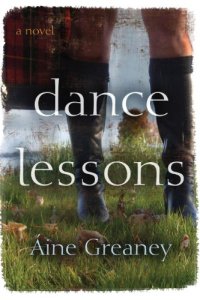Dance Lessons by Áine Greaney
 Tuesday, March 29, 2011 at 11:25PM
Tuesday, March 29, 2011 at 11:25PM 
Published by Syracuse University Press on April 11, 2011
Dance Lessons is a story of hidden truths and unspoken memories. The interwoven stories that comprise Dance Lessons begin with Ellen Boisvert, a child of French Canadian parents, and Fintan Dowd, an Irish immigrant working illegally as a Boston bartender. They meet and marry and are near divorce when Fintan dies in a sailing accident. At the novel’s center, however, is Fintan’s mother Jo; from her story all the others radiate. Jo takes stoicism to a new level; she prides herself on bearing pain and misfortune. It is “bitter sacrifice that forms the core, the credo of Jo Dowd’s very existence.” Jo sacrifices her future to wed a man chosen by her parents, a man who can live on the family farm and do the chores her aging father can no longer handle. She sacrifices companionship when her loquacious sister moves to the city, leaving her husband and parents to settle into a “deep silence, a silence that seems to have a life of its own.” Unable to tell Fintan that she is proud of his scholastic achievements, filled with resentment of the woman he loves, she sabotages his happiness and sacrifices the bond between parent and child. Sacrifice has warped Jo Dowd, and that is the condition she is in when Ellen finds her -- a condition magnified by the cancer growing in her lungs.
At one point in the story, a character wonders what “terrible, awful thing” he would have to do to make his child “deny his very existence.” That is ultimately the question Ellen seeks to answer. After Fintan’s death, she learns that his mother is not dead, as he had always claimed, and she travels to Ireland to find Jo. She says she wants to put her husband’s ghost to rest, but it’s never clear why she believes meeting Fintan’s mother will help her achieve that goal. For reasons that are again unclear (particularly given her decision to end her marriage), Ellen wants to know why Fintan kept his mother’s existence a secret. The trip to Ireland seems like a contrivance designed to introduce the reader to Jo, but that is a minor complaint given the compelling story that follows.
The narrative ultimately comes full circle, beginning and ending with Ellen. Along the way, it jumps between the past and present: between Jo’s deteriorating relationship with Fintan and Ellen’s discovery of the events that caused their estrangement. We see parallels as the twin stories develop: similarities in the behavior of Jo toward Fintan and of Fintan toward Ellen; the absence of family connection, evidenced in Jo’s household by silence and in Ellen’s by meaningless conversation at holiday dinners, family members “making noise -- words to while away the hours until everyone retreated back to his or her own world.” As it tells these twin stories, the novel branches into other lives that have been touched by the tragedy of Fintan’s upbringing. At some point the novel starts to read like a literary mystery, with Ellen trying to piece together Fintan’s relationships and tease out the cause of his estrangement from Jo.
Apart from Ellen, there aren’t many significant characters in Dance Lessons a reader might like. The novel’s strength lies in its ability to make the reader understand and even empathize with unlikable people. Ellen comes to know her husband and in so doing, comes to terms with his death, with their failed marriage, and with her grief. In some respects, the ending, starting with a chapter that is almost an epilogue and continuing to the actual epilogue, seems false, out of synch with the rest of the novel, as if Áine Greaney felt a need to bring the storylines to a “feel good” conclusion that would please readers after exposing them to such sad and difficult lives. At the same time, the pre-epilogue ending offers additional insight into Jo, jolting the reader with another small shock.
There are moments when the beauty of Áine Greaney’s prose dominates all else: gently rhythmic sentences, descriptions of sights and sounds and smells that stimulate the reader’s senses. At other times the hushed drama of futile hopes and despairing lives prevails. Greaney makes subtle changes in the narrative voice as the novel shifts from rural to urban, from the United States to Ireland to England, from older characters to younger ones. Both in prose style and in content, Greaney crafted a mesmerizing novel.
HIGHLY RECOMMENDED